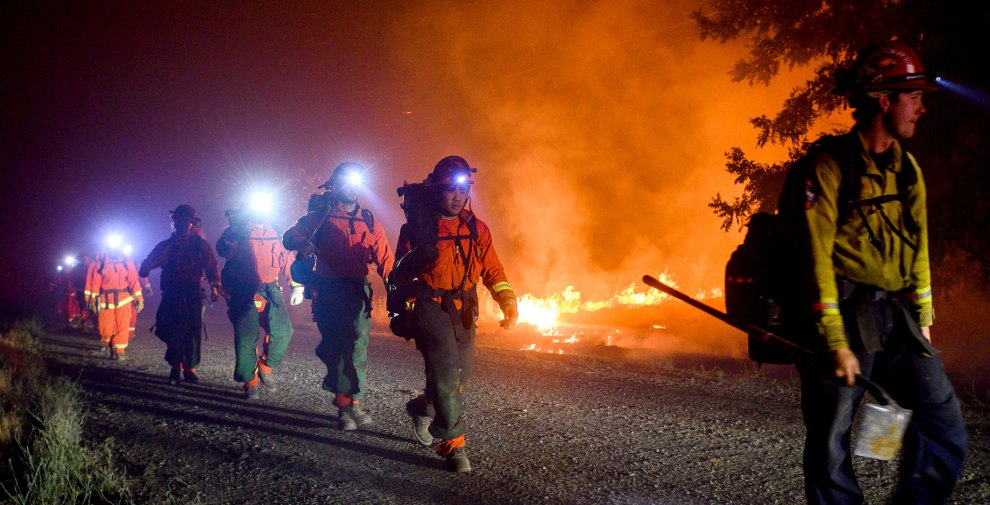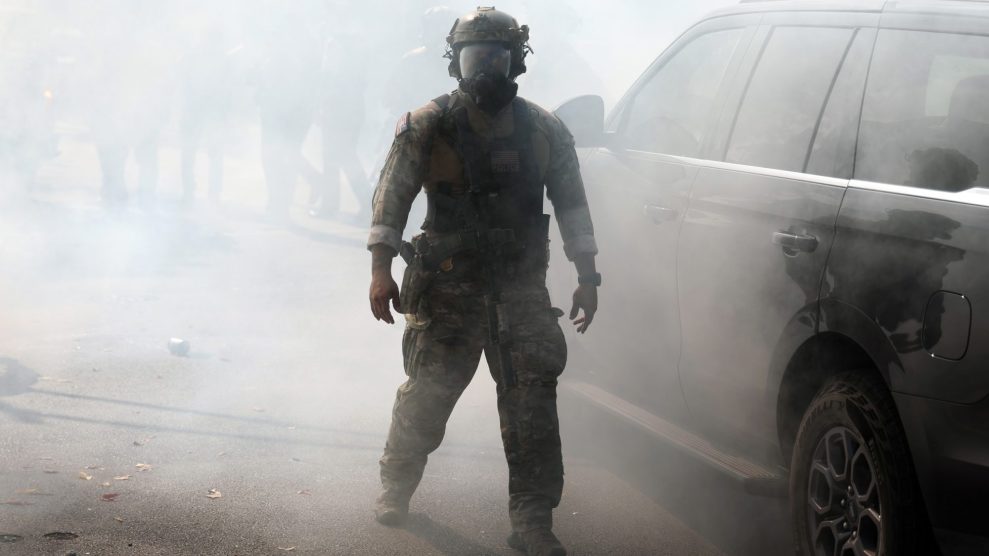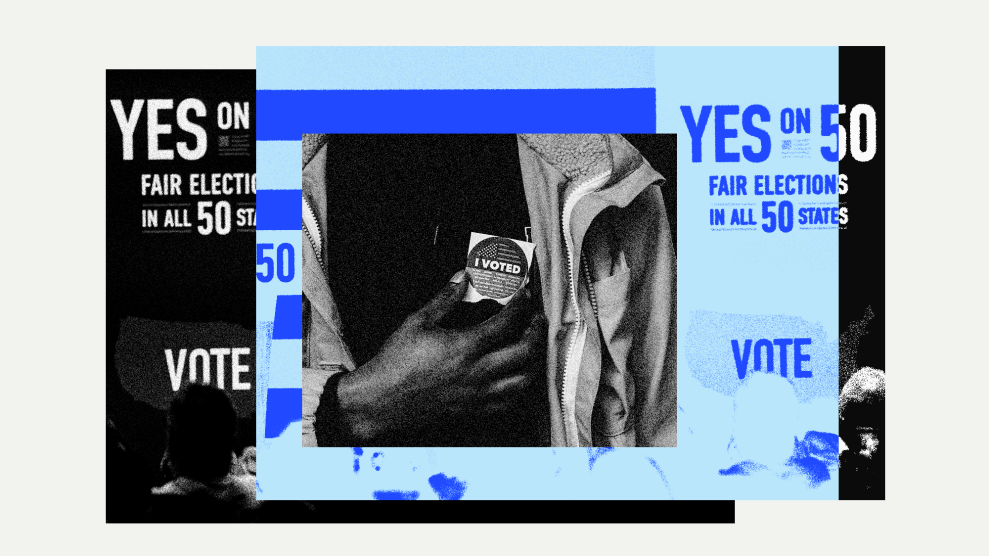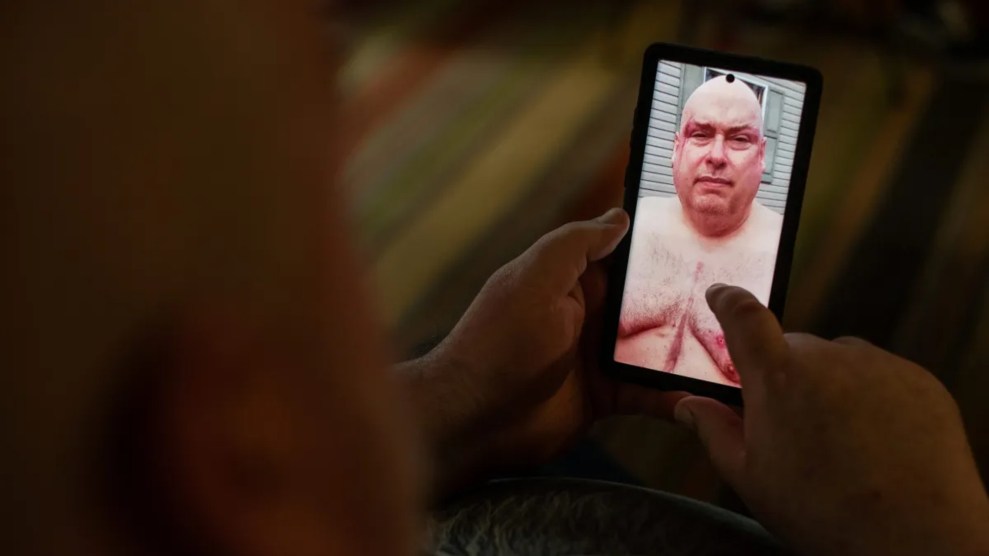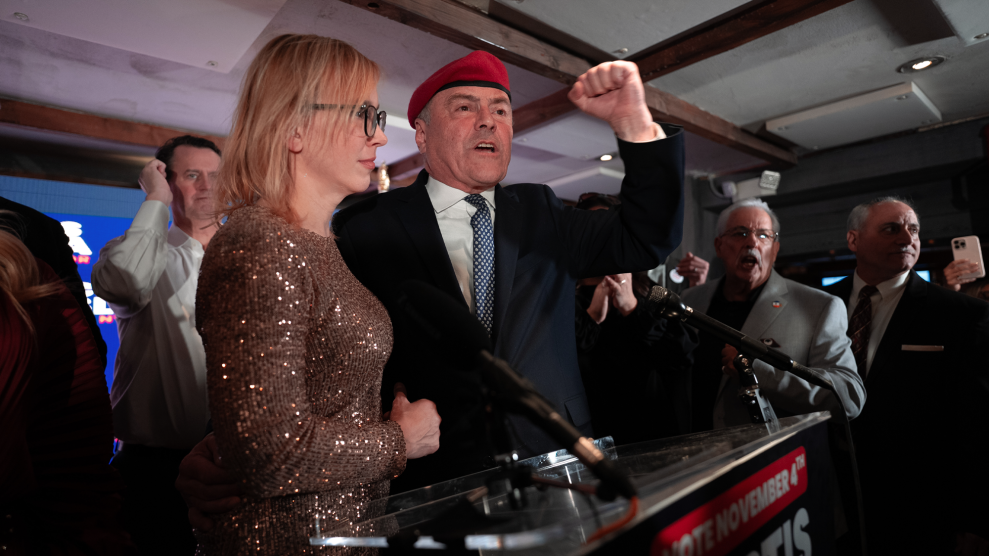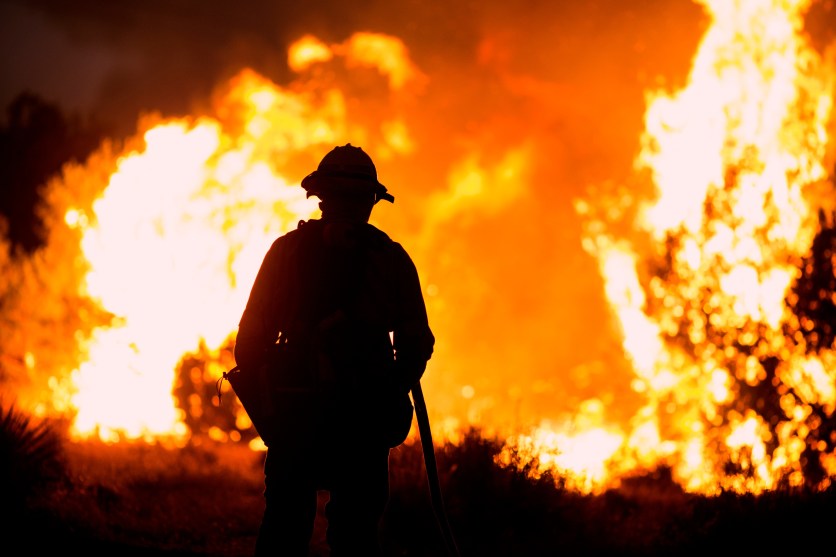
The risks to firefighters’ health have worsened across the West in recent years as more wildfires have broken out and damaged or destroyed communities and wildlands. In this photo, a firefighter watches as the Bobcat Fire burns in Juniper Hills, California, on Sept. 19, 2020. The year’s wildfire season set a state record, with nearly 10,000 fires burning more than 4.2 million acres.Shuttershock
This story was reported by Public Health Watch and is being co-published by Investigative Reporting Workshop and Mother Jones.
Even as wildfires intensify each year, the people who risk their lives to fight them are often denied workers’ compensation for what firefighters contend are job-related cancers.
This is happening even though all 50 states have laws or programs that presume at least some cancers in firefighters are work-related, in theory making it easier for them to qualify for benefits.
California, for instance, has one of the nation’s strongest and oldest “presumption” laws, covering all types of cancer. Yet that hasn’t stopped local governments from denying or delaying workers’ comp benefits, which cover out-of-pocket health costs and paid time off for recovery and treatment.
San Jose firefighter and paramedic Kenneth Allen, diagnosed with a rare olfactory nerve cancer, is among those who have battled for years to get his benefits.
The city rejected his workers’ comp claim not just once, but twice. It took three years to get a settlement. When Allen’s cancer returned, the city said he had exhausted his benefits. Unable to work, Allen had to sell his home.
In October, the city cut off Allen’s health insurance because he’d been off the job for more than a year. He has been waiting for nearly a year to learn whether he can retire on disability.
“I wasn’t expecting it to be easy,” said Allen, 45. “But certainly if I have dedicated my life to saving other people at the risk of my own life and health, I don’t think that [this] should be a battle we have to fight on top of everything else.”
San Jose city officials did not respond to a detailed list of questions and requests for comment about Allen’s experience.
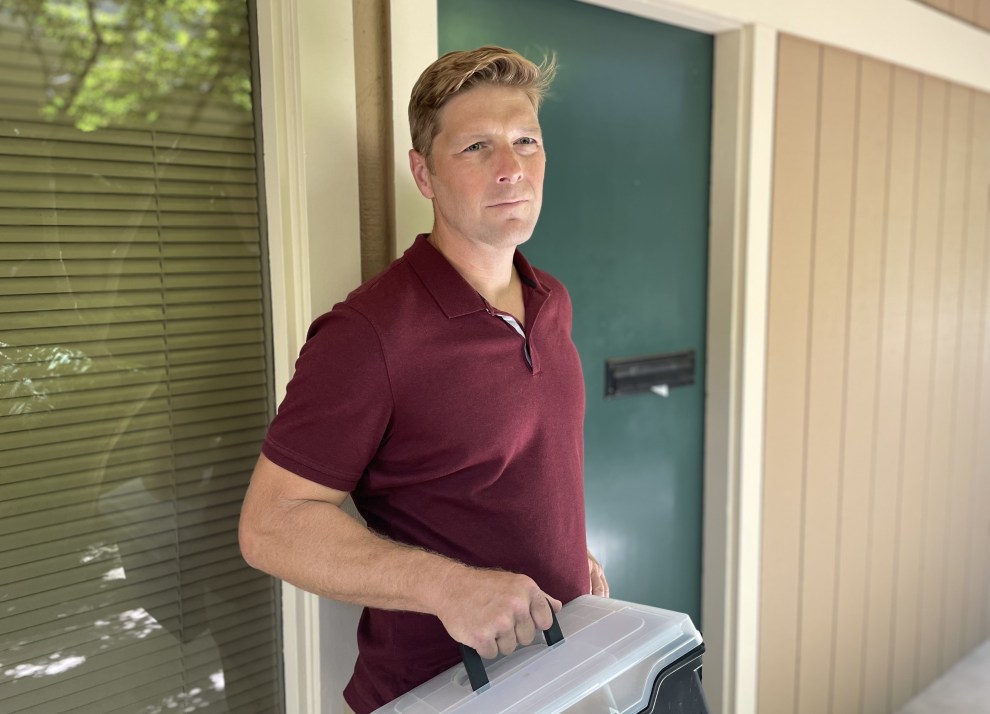
San Jose firefighter Kenneth Allen with documents from his case after a medical examiner’s review of his petition for disability retirement.
Barbara Feder Ostrov
Presumption laws for first responders imply that workers’ comp claims will be automatically approved for eligible conditions like cancer. But the laws allow employers to challenge claims as not job-related; employers bear the burden of proof. Could decades of cigarette smoking or a previous job at an oil refinery have caused the cancer instead? Was a firefighter’s prostate cancer caused by a genetic predisposition to the disease?
Officials say they must evaluate cases carefully, often engaging in lengthy investigations, to protect taxpayer dollars.
Firefighters say the denials aren’t justified in light of presumption laws and the mounting evidence of the links between firefighting and cancer.
“I tell firefighters, ‘You’re a hero, until you cost them money, then you’re a zero,’” said Scott Jennie, a retired Laguna Beach, California, fire captain who is now a state director for the Firefighter Cancer Support Network.
It’s difficult to pin down how often firefighters’ workers-comp claims for cancer are rejected. States aren’t consistent in how they track claims data, and there’s no national workers’ comp database. Data reported by employers, or the companies they hire to manage claims, often is incomplete, state officials say.
Data obtained from several states and cities by Public Health Watch indicate rejection rates for cancer claims vary widely.
Many firefighters eventually win their cases, but lawyers who represent them say local governments often slow-walk cancer claims, imperiling firefighters’ financial, physical and mental health. In some cases, cities have sued firefighters or state workers’ comp agencies to avoid paying for expensive treatment and paid time off.
The legal disputes can delay firefighters’ benefits for months or years; some have died waiting for a decision. Advocates and lawyers blame cities’ contracted administrators for adding to the delays, saying they insulate city leaders from public criticism about firefighters’ workers’ comp experiences.
In the past 10 years, for example, San Jose firefighters’ workers’ comp claims for cancer have taken an average of two years to resolve, according to city data obtained through a public records request. Some claims have dragged on far longer—up to six years—the data shows.
“The way that most employers view work comp claims is not, ‘Gee, this firefighter or this police officer just got injured on the job, we’ve got to make sure we take care of them.’ It’s really almost the exact opposite,” said Robert Sherwin, a workers’ compensation attorney in Woodland Hills who represents first responders. “I just see a standard culture of delay and deny.”
A Cancer-Causing Profession
Many studies have linked urban firefighters’ on-the-job exposure to toxic substances with an increased risk of cancer.
More recently, as development encroaches more on wilderness areas, wildfires pose added risks to firefighters, a study published in 2019 found. Fire-suppressing foam and “turnout gear,” or protective suits—both of which may contain chemicals called PFAS—also expose firefighters to carcinogens. Climate change is extending the wildfire season in Western states, elevating the risks.
In response, fire agencies across the nation are more strictly enforcing cancer prevention measures, including prompt decontamination and showering and more frequent cancer screenings.
Cancer is now a leading cause of death for the nation’s more than 1 million career and volunteer firefighters. The statistics are personal for many firehouses, as cancer strikes active and retired colleagues. At a ceremony last July for the California Firefighters Memorial in Sacramento, Brian Rice, president of the California Professional Firefighters union, said nearly half of the 82 honorees died from job-related cancers.
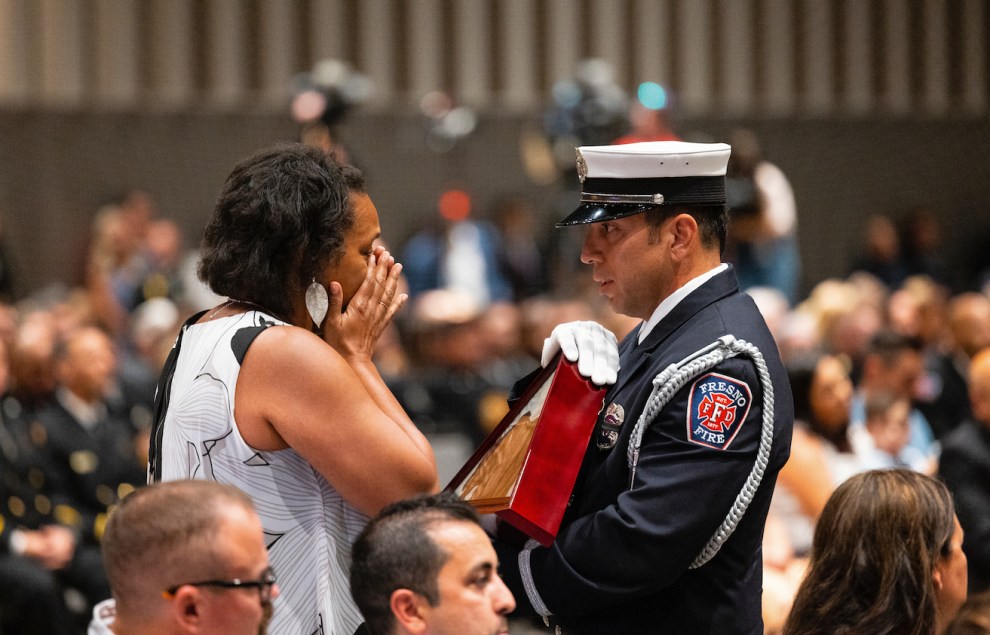
Rochelle Crawford as a framed California flag is presented to her in honor of her late father at the California Firefighters Memorial ceremony last July.
Robbie Panco for the California Fire Foundation
In July 2022, after a review of research, the World Health Organization reclassified firefighting as a definitively cancer-causing occupation after years of calling it “possibly” carcinogenic.
It was a victory for firefighters around the world, who saw it as an acknowledgement that science had finally caught up with their own experience. The new classification may make it harder for employers to deny firefighters’ cancer claims.
But even as evidence of cancer risks grows, firefighters in many states still must prove exactly where and how they were exposed to specific carcinogens: asbestos, soot, wood combustion products, benzene and diesel exhaust from fire trucks, among other substances.
Fire chiefs now exhort their firefighters to document every exposure through forms or even a new cellphone app, so they will have a better chance of winning any future claims.
A Life-Changing Tumor
Allen first filed for workers’ compensation in 2016 after doctors detected and removed a golf ball-sized tumor on his olfactory nerve behind his eyes. While undergoing follow-up radiation therapy in early 2017, he learned his claim had been denied by an insurer contracted by the city to handle workers comp claims.
Allen took seven months off, burning through his vacation and sick days and time off donated by colleagues. Without the paid time off that workers’ comp provides for recovery, he would have no income to support his wife, who works part-time as a chef, and his then-infant son.
Allen returned to light-duty office work for a few weeks and then full-duty shifts. He learned to live with memory lapses, dizzy spells and impaired balance. He kept quiet about losing his sense of smell and much of his sense of taste. “I wanted to return to the line,” Allen said.
It would take three years of legal wrangling before the city agreed in 2020 to pay Allen a workers’ comp settlement of $97,000, plus a year of paid leave and health insurance. His lawyer received 15% of the payout.
The victory was short-lived. In March 2020, around the same time he was finalizing his settlement, Allen learned that his cancer had re-emerged.
Presumption Laws Vary
Cancer presumption laws emerged in the early 1980s as states began recognizing more of the unique hazards faced by first responders.
The laws vary widely in what’s covered. Some states like California and New Jersey cover all cancers. Others, including West Virginia and Utah, cover only a handful. A few states offer special compensation programs for firefighters, bypassing the workers’ comp system. Many laws also cover heart and lung disease, PTSD and COVID-19.
In Texas, employers each year initially rejected 76% to 96% of 198 cancer workers’ comp claims filed by first responders, including firefighters and police, from 2012 to 2018. Even after the state in 2019 broadened its cancer presumption law after firefighters criticized the high rejection rates, first responders still were denied between 29% and 69% of the time through April 2022, according to Texas Department of Insurance data.
Some states like New York and Florida offer cancer benefits for firefighters that are separate from state workers’ comp systems. These alternate programs aren’t tracked statewide.
In New York, 24 salaried firefighters outside New York City filed workers’ comp claims for cancer over the past decade. (New York City firefighters and volunteer firefighters outside the city are covered by alternative programs.) Each was initially denied, according to data obtained through a records request. Four claims were ultimately approved. It’s possible firefighters with cancer get benefits from alternative programs, but the state does not collect data on how many.
In Florida, a 2019 presumption law entitles firefighters to treatment and a one-time payment of $25,000 if they are diagnosed with one of 21 cancers and meet other requirements. The benefits are an alternative to the state’s workers’ comp program, which has rarely approved firefighter cancer claims. Of the 41 cancer claims filed between 2019 and early 2023, 38 were initially denied, and of those, four resulted in some benefits. No statewide data on rejection rates for the alternative program was available.
Workers’ comp lawyers told Public Health Watch that government officials across the country initially reject cancer claims as a routine matter. Some cities go to great lengths to contest their firefighters’ cancer claims.
In 2018, the Texas city of Baytown sued one firefighter with thyroid cancer to avoid paying for 18 months of treatment. In a 2019 settlement, the city dropped its bid to recover money it had already paid the firefighter, but he had to withdraw his workers’ comp claim for additional benefits. Two small California cities have brought similar actions. In Idaho, the city of Pocatello appealed a fire captain’s workers’ comp benefits for leukemia, challenging the presumption law; the state’s supreme court ruled against the city last May.
The Phoenix suburb of Goodyear, Arizona, through its insurer, has twice denied the claim of firefighter Gilbert Aguirre, who was diagnosed in 2015 with chronic myeloid leukemia at the age of 35, despite the firefighting honors he has received. The fire chief gave him a unit commendation and a local Elks organization in 2020 named him firefighter of the year. He is still fighting for his benefits.
In Ohio, the cities of Dayton and Toledo sued several firefighters to appeal claims they had won from Ohio’s workers’ comp agency, losing in each case.
In taking claims to court, some employers call expert witnesses who deploy scientific and obscure points about research methodology to cast doubt on firefighters’ cancer claims, according to court records reviewed by Public Health Watch. Judges rule inconsistently, often because of vague language in presumption laws, according to a 2018 report by the National Council on Compensation Insurance, a research organization.
Firefighters have found that pinpointing the cause of cancer can be extraordinarily difficult. Genetic, behavioral and environmental risk factors come into play. Firefighters who once smoked, for example, have seen their cancer claims denied because employers can cite a plausible alternative cause. Other firefighters are denied because their cancer’s latency period—from carcinogenic exposure to diagnosis—doesn’t match the years they worked, suggesting the cancer may not be job-related.
In theory, workers are supposed to get their health care for job-related injuries or illnesses from doctors approved by the workers’ compensation system. Because many cancers require urgent treatment, however, firefighter unions often advise their members to get medical help immediately, even if it means paying hefty insurance co-pays and deductibles; health insurers can recoup costs from workers’ comp if a firefighter’s claim is approved.
Depending on the state, workers’ comp benefits offer paid time off to recover and coverage of in-home health care, transportation to medical appointments, insurance co-pays, disability and, when the disease is fatal, death benefits for families.
If a claim is denied or delayed, cancer often proves to be a daunting financial burden for firefighters and their families. Crowdfunding campaigns for firefighters are common.
Difficult Choices
In early 2020, Allen felt dizzy, disoriented and anxious. His wife urged him to return to the doctor, who told Allen his cancer had returned. He needed a second surgery and more radiation treatment.
Allen’s firefighting days were over.
He already had exhausted much of his paid leave from his first workers’ comp settlement. He applied to reopen his claim seeking additional benefits, but the city declined, saying he already had maxed out his benefits from that claim. With the help of a new attorney, Allen was able to cobble together his remaining benefits and sick and vacation days for some income to keep his family afloat.
Allen worried he could not keep up payments on his home in Marin County, which he had bought a few months before he was first diagnosed. He sold the house and moved his family into a Novato house he rented from his parents.
He filed a separate workers’ comp claim for other injuries, including PTSD and back pain, seeking temporary benefits to carry him through a second surgery. But the city said he no longer qualified as a firefighter because he’d been off the job for so long.
After some legal back and forth, the city made an offer that demoralized him: two months of pay to settle his second workers’ comp claim (15% for his attorney), but no health insurance.
Allen felt he had no choice. He took the deal and bought a high-deductible federal marketplace health plan for his family, including his wife, his young son, and a new baby.
“It’s like a final kick-you when you’re down,” Allen said.
Fighting Presumption Laws
Cities and counties have long lobbied against expanding workers’ comp presumption laws for first responders, saying an avalanche of claims could bankrupt small local governments.
In 2022, for example, the California Association of Cities and Counties and other employer groups succeeded in weakening a new state law to shorten the time employers have to investigate cancer and other claims covered by presumption laws. The employers’ deadline to reject a claim was raised from 30 to 75 days in the final bill; fines for “unreasonably rejected” claims were cut in half, to $50,000.
Still, the groups argued that investigations of complex claims often take longer than the bill would allow, and the fines remained draconian.
“Not every claimed injury is valid and a portion of them are, in fact, fraudulent,” the groups said in a statement requesting a veto by Gov. Gavin Newsom.
Yet some data indicate that employers’ financial exposure may be lower than they suggest.
For instance, a federal presumption law passed in December will make it easier for firefighters to qualify for workers’ comp if they are diagnosed with cancer, heart disease or other conditions. A Congressional Budget Office analysis found that over a decade, 300 to 400 additional workers would qualify for the benefits, at a cost of $23 million.
The federal government employs more than 10,000 firefighters, most through the U.S. Forest Service.
Since 2013, more than 25,000 workers’ comp claims have been filed by federal firefighters; only 30 had a diagnosis of cancer or a tumor, according to data obtained through a Freedom of Information Act request. Of those, 10 were denied benefits, 11 were accepted and the remainder are pending or were withdrawn.
In California, it’s difficult to know how many firefighter cancer claims are rejected because of the way the state maintains claims data. But the State Compensation Insurance Fund, which covers 165 fire agencies, received only 51 claims for cancer during the past decade. It rejected 18 of those claims; a handful were successfully appealed.
Statewide, of nearly 8,000 firefighter workers’ comp claims filed for all reasons between 2013 and 2022, about 13% involved cancer, according to data provided by the California Department of Industrial Relations. The data, however, did not indicate the outcome of most of the cancer claims. Of the 106 cases designated as closed, only a handful were noted as denied or accepted in the data. More than 20% of cancer claims involved skin cancer, with firefighters often saying they had to work outdoors in the sun.
An Uncertain Future
After six years, Ken Allen awaits a final decision on whether he can retire on disability and how much money he will get. In early February, a committee recommended that the city’s police and fire retirement board accept his disability retirement, describing it as an “open and shut” case, but a final decision isn’t expected until March.
In the meantime, Allen accepted a job as a full-time instructor teaching emergency medical technician classes at the College of Marin, something he’d been doing part-time. He’ll earn less than he did as a firefighter, he said, “but I have to find some ways of supporting my family.”
“I gave my body to this profession under the assumption that if anything like this were to happen, they’d take care of the people who take care of everyone in the city,” Allen said. “I don’t know what I am to them. Not an employee—certainly not someone who needs their help.”
